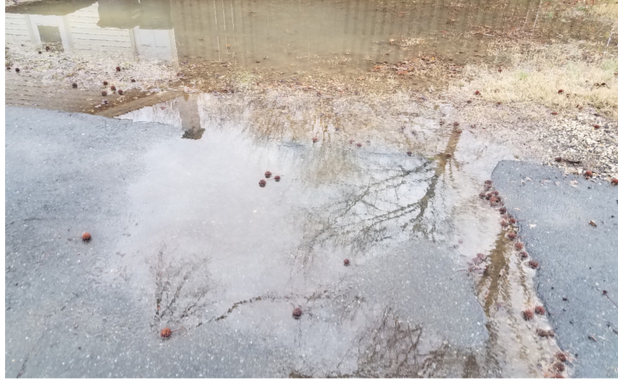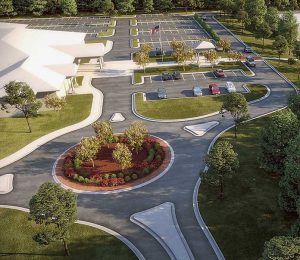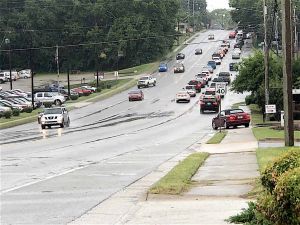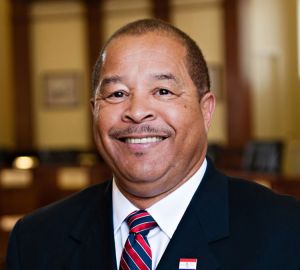Fayette, Fayetteville sympathetic but law prohibits working on private property
For two homeowners on Honeysuckle Lane in unincorporated Fayette County, and with their property adjacent to the city limits of Fayetteville, their years-long battle with stormwater flooding their property and causing damage after flowing off a nearby commercial site seems to have no end. For their part, the city and county recognize the dilemma and yet are prohibited from performing work on private property.
Homeowner Doug Brantley has expressed his dilemma at meetings of the City Council and County Commission, citing his ongoing troubles and that of his neighbor, Gina Duffy. Brantley in those meetings noted the multiple years that the flooding onto their properties has occurred.
While there is no current way to know what will transpire, at play is the reality that the issue appears to be between two groups of private property owners — the Honeysuckle Lane residents and the owner of the Banks Station commercial property from which a portion of the stormwater runoff drains.
It should be noted that local governments are prohibited from doing work on private property.
Brantley at local government meetings noted the significant damage caused to both neighbors’ properties due to stormwater runoff, including flooding and sinkholes. He surfaced the concern that either or both of the local governments might address the flooding issue and the problems associated with it.
A lengthy April 24 email from Fayette County Environmental Management Director Vanessa Tigert Birrell pertaining to the issue was forwarded by County Administrator Steve Rapson, who said, as he has at county commission meetings, the county has and will perform needed work in the county right-of-way, but can go no further.
Outlining the stormwater drainage issue, the email from Birrell said, “Approximately 50 acres drain to a corrugated metal pipe, traversing 145 Honeysuckle Lane and terminating in a junction box in county right-of-way underneath a second driveway at 145 Honeysuckle Lane. From the upstream junction box, a 36-inch diameter concrete pipe runs under Honeysuckle Lane and terminates in a downstream junction box outside the right-of-way. From this downstream junction box another metal pipe runs the property length of 150 Honeysuckle Lane. As of April 2019, the metal pipes crossing private properties (145 Honeysuckle Lane including underneath the second driveway and 150 Honeysuckle Lane) have failed. The concrete pipe under the road is cracked and has joint separation. Staff suspects a perennial stream runs through a portion of the drainage system.”
Portions of Birrell’s email stated:
• Ms. Duffy said she had lived on and near her property since she was a child. She was the initial homeowner, and the pipe running through her property was present before the house was built. When she bought the house and initially lived there, flooding of her house or back yard was not a problem. She stated that water seeps over the backyard fence, causing the fence to lean over. This is in addition to the pipe failing and the concrete breaking up.
• The upstream and downstream property owners may elect to convey water via open ditch, pipe or other means. Fayette County will do all we can to accommodate their plan/preference. Permitting and design standards will have to satisfied.
• Work within the Honeysuckle Lane right-of-way will best convey stormwater through a properly-sized and maintained drainage system downstream (i.e., across 150 Honeysuckle Lane). Below 150 Honeysuckle the system is open ditch/live stream. Staff stressed during the meeting that permanent and proper improvements are meaningless without the downstream issue being addressed.
• Fayette County will share hydrology and hydraulic calculations used for county pipe design with both property owners.
• There was discussion and agreement that the work proposed within the county right-of-way will not address drainage problems and infrastructure damage upstream on 145 Honeysuckle. Repairing the downstream sections will, however, allow the water to drain more efficiently from 145 and is a necessary step for a holistic solution.
• Fayette County, or a hired consultant, will perform the necessary engineering work to design, size, permit and install new pipe under the road. We anticipate a permit from the Army Corps of Engineers will be required (and possibly other permits) and a downstream analysis. The downstream analysis helps ensure flooding problems are not transferred to structures/property downstream.
Based on a preliminary evaluation, Fayette County Public Works recommends that the county pipe under Honeysuckle Lane be replaced. The new pipe will be reinforced concrete and sized to current county standards (i.e., designed to carry up to and including the 25-year storm event). In addition, Public Works recommends that both junction boxes be removed and each end of the pipe will have appropriate end treatments and grading. The design assumes that at least a portion of the conveyance system be open ditch. Ditches generally have more carrying capacity and are cheaper to install. However, if either (or both) property owners prefer to rebuild the pipe system across their property, the county’s plan can be modified to accommodate that option.
A statement from the City of Fayetteville pertaining to the issue noted that “The City is working with the commercial plaza owner to address some deficiencies in the upstream detention pond. This is a separate issue we believe, and feel that the city does not have any liability in this particular matter, even though we are looking for ways to help out.”
Also noted by the city was that Fayetteville leaders have met on-site to see how we could be of assistance.
“The home is located in unincorporated Fayette County and not within the city limits of Fayetteville. Of course, we want to help and will do everything we can in this situation. There is the possibility of the County and City working together to identify this as a project in our Hazard Mitigation Plan update, but those discussions have yet to take place,” the city said.
It has been clear in meetings where Brantley has spoken, that all the local government officials and staff recognize the pressing nature of the issue, yet all are forbidden from doing work on private property.
As for what is next, Birrell’s email said the next steps include Fayette County having requested feedback from Brantley regarding his plans to address the drainage problem on his property.
“He believes it is a county issue to fix, but said he would get back to us. All parties agreed to continue communicating and acknowledged we are working towards a common goal,” the email said.













Leave a Comment
You must be logged in to post a comment.